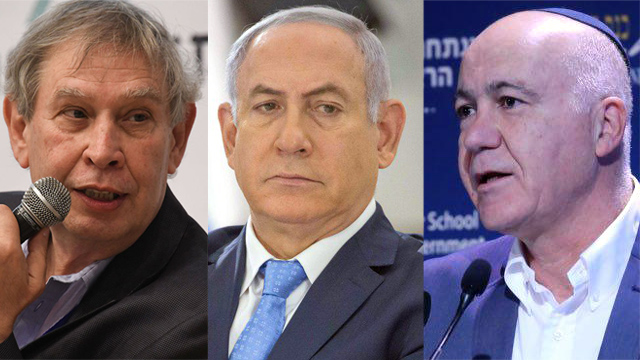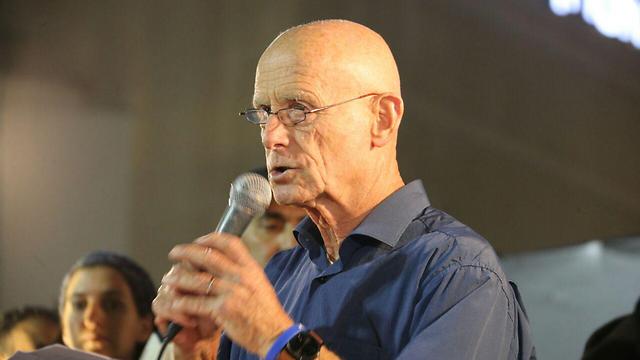
Major-General (res.) Ami Ayalon
Photo: Motti Kimchi

Ex-Shin Bet chief: Prime ministers have requested surveillance of IDF generals in the past
Amid reports that Prime Minister Netanyahu asked former Shin Bet Director Yoram Cohen to listen to the Mossad chief and IDF chief of staff, Major-General (res.) Ami Ayalon tells Ynet that the general security service has received requests to listen to generals since 1970s; current affair, he says, is based on 'unfounded hatred for the prime minister.'
Generals have been wiretapped in the past for fear of leaks and such surveillance is justified in the event of a sensitive operation, former Shin Bet chief Major-General (res.) Ami Ayalon told Ynet on Sunday amid reports
that Prime Minister Benjamin Netanyahu had asked former Shin Bet Director Yoram Cohen to listen to the Mossad chief and IDF chief of staff.

"I think that we just love to hate, and this time it really is unfounded hatred," Ayalon said about the criticism directed at the prime minister.
"We are completely misunderstanding the whole situation," Ayalon explained. "A general security service is responsible by law for the state's security, for a democratic regime's procedures, for threats of sabotage, terror, exposure of state secrets.
"According to the law, as soon as I understand, and I have no information beyond what was written in the paper, in the case of a top secret operation, that a leak of its future existence could endanger citizens or the state, it is the General Security Service's job—even without the prime minister's request or order—to ensure that nothing is leaked. What does a general security service do? That's the service director's problem. If he has to listen, he submits requests and is entitled to listen according to the proper procedures."
Can a prime minister, a political echelon, ask a Shin Bet director to wiretap another body's director? For example, if you're listening to the chief of staff, you may be listening to the opposition leader as well.
"There is a big difference between the chief of staff and the opposition leader, because the opposition leader is protected by the law and by his immunity. Doctors, lawyers, public representatives are protected by the law. The chief of staff and Mossad director are civil servants.
"Espionage books say the biggest spies were senior officials in the CIA, in the FBI, in the MI5 and MIC. So logically, based on past events and on justice and ethics, it's unthinkable that a sergeant or a corporal would be put under surveillance because we are afraid they leak information, but we won't listen to the Mossad chief or chief of staff because they are trusted. Trust has nothing to do with it."
When can the Shin Bet chief refuse?
Ayalon explained that this sometimes means no harm. "We love to hate the prime minister, and there are a lot of things in his policy that I disagree with. If I had to advise him on how to respond to this leak, I would say to the media: Gentlemen, I am in charge of the Israeli citizens' security, among other things, and I instructed the Shin Bet chief to do whatever it takes to ensure that there would be no leaks."
Asked whether the media had given too much weight to the wording of Yoram Cohen's denial, Ayalon responded: "Sometimes, because of impossible leaks from the General Staff, mainly leaks for generals' promotion purposes during happy times, in the 1970s, 1980s and even 1990s, prime ministers asked the Shin Bet chief to wiretap generals at least once or twice, as far as I know from studying history.

From left to right: Former Mossad chief Tamir Pardo, Prime Minister Benjamin Netanyahu, former Shin Bet chief Yoram Cohen (Photos: Yair Sagi, Emil Salman, Motti Kimchi)
"It's totally unrelated to the State of Israel's security, it's on the level of promotional gossip, if a prime minister asks to listen to senior police or military or Mossad officials because they are leaking information for promotion purposes. In this case, the Shin Bet chief should say no. But when the issue is a sensitive operation, if I were the Shin Bet chief I wouldn’t automatically refuse.
"The wiretapping still requires approval, these things are regulated by law. I think we just love to hate, and this time it's really unfounded hatred," he added.
"According to my understanding," Ayalon said, "there was a crisis of faith between Netanyahu and senior defense establishment officials. We had a similar crisis of faith when I was the Shin Bet director. Netanyahu has been having this crisis of faith for many years. But in this specific case, I believe the crisis of faith is irrelevant. If leaked, this information could jeopardize the State of Israel's security, so it's in accordance with the law."
During your service under three prime ministers, were you asked to wiretap senior officials in Israel?
"I was asked to wiretap and I refused, although there was no law. At the time the police were fighting what was known as 'the Russian mob' on issues of funds, money laundering, etc. The police didn't have all the tools to fight this threat and I was asked, not by the prime minister but with the knowledge of the relevant ministers, to help the police with this issue.
"I said, gentlemen, the State of Israel gave the Shin Bet its authority for very specific issues, and this isn't one of them. If you want to, go ahead, there's an attorney general."
















